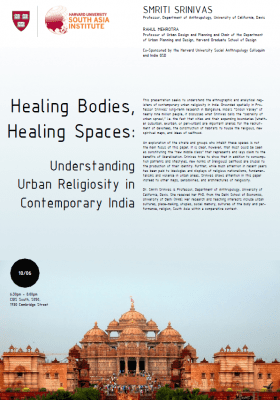Urbanization Seminar
Smriti Srinivas, Professor, Department of Anthropology, University of California, Davis
Chair: Rahul Mehrotra, Professor of Urban Design and Planning and Chair of the Department of Urban Planning and Design, Harvard Graduate School of Design
Cosponsored with the Harvard University Social Anthropology Colloquium
This presentation seeks to understand the ethnographic and analytical registers of contemporary urban religiosity in India. Grounded spatially in Professor Srinivas’ long-term research in Bangalore, India’s “Silicon Valley” of nearly nine million people, it discusses what Srinivas calls the “sacrality of urban sprawl,” i.e. the fact that cities and their expanding boundaries (whether suburban, exurban, or peri-urban) are important arenas for the recruitment of devotees, the construction of habitats to house the religious, new spiritual maps, and ideas of selfhood.
An exploration of the strata and groups who inhabit these spaces is not the main focus of this paper. It is clear, however, that most could be seen as constituting the “new middle class” that represents and lays claim to the benefits of liberalization. Srinivas tries to show that in addition to consumption patterns and lifestyles, new norms of (religious) selfhood are crucial to the production of their identity. Further, while much attention in recent years has been paid to ideologies and displays of religious nationalisms, fundamentalisms and violence in urban areas, Srinivas draws attention in this paper instead to other maps, sensibilities, and architectures of religiosity.
Dr. Smriti Srinivas is Professor, Department of Anthropology, University of California, Davis. She received her PhD. from the Delhi School of Economics, University of Delhi (1995). Her research and teaching interests include urban cultures, place-making, utopias, social memory, cultures of the body and performance, religion, South Asia within a comparative context.

